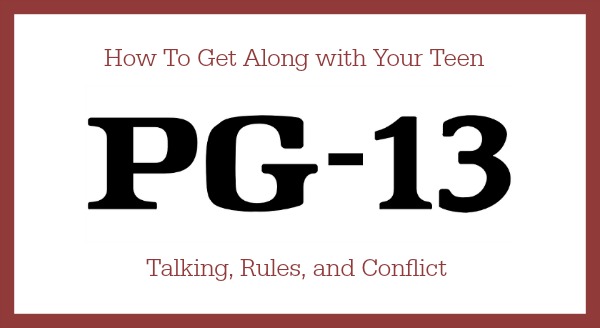Psychology Classics On Amazon

How to Get Along with Your Teen: Talking, Rules, and Conflict
Dr. Shannon Kolakowski
Dr. Shannon Kolakowski is a psychologist in private practice in Seattle, helping people with depression, anxiety, and relationship issues. She is the author of When Depression Hurts Your Relationship: How to Regain Intimacy and Reconnect with Your Partner When You're Depressed and Single, Shy and Looking For Love: A Dating Guide for the Shy and Socially Anxious. Dr. Kolakowski writes a blog for the Huffington Post and has been interviewed for publications such as Redbook, Men's Health Magazine, Shape, eHarmony, and ParentMap.
Talking with your teen about difficult topics can be stressful for both you and your adolescent. It may feel like you and your teen are on opposite sides of a spectrum. This article reviews a few key ideas to keep in mind when delving into those challenging discussions that inevitably arise during adolescence.
Setting Rules
There are four basic approaches to parenting and setting rules for the family. The style of parenting used when dealing with conflict often has to do with how the parent themselves were raised and in what cultural environment they were surrounded in, and also the temperament of the child. Research has consistently shown that the “authoritative” style of parenting results in the most well-adjusted teens. But what does authoritative parenting look like in practical terms? What is important when talking to your teen is to keep in mind that setting rules and limitations is very important. However, how you set those rules and limitations is even more important, because maintaining the relationship, while teaching your teen how to make decisions for themselves, is essential. The following parenting styles are outlined below.
Authoritarian - Aka “Tiger Mom”. This type of parent is very demanding, and less responsive to the needs of the teen. They use punishment, threats, deprivation, and other power differentials to gain compliance from their child. Research shows that this type of parenting results in teens who are irritable, aggressive, mistrusting, dependent, and have lower self-esteem.
Permissive - Permissive, indulgent parents are often warm and caring, but place low demands on the child and are non-punitive, and are lacking clear boundaries. They tend to allow teens to make their own decisions about chores, bedtime, school, etc. These teens tend to be immature, impulsive, easily frustrated, more self-centered, and lower achievement and independence.
Rejecting/Neglecting - These parents display a low level of responsiveness to the teen’s needs and are also low in the demands and expectations they hold for their teen. Parents may also be hostile towards teens at times. These teens tend to have poor self-esteem, poor self-control, are impulsive, moody, and aggressive. Research has shown that parenting that is low in warmth, lacks supervision, and uses harsh, inconsistent punishment is associated with teen delinquency.
|
Authoritative - These parents balance rational control and responsiveness to their teens needs. They set clear rules and standards, and they use reasoning with their teens, praise their positive attributes and accomplishments, give explanations for their decision making process, and encourage independence. Research has shown that this parenting style is more likely to result in teens who are assertive, socially responsible, achievement-oriented, have higher self-esteem and confidence, and better academic achievement. |
Find A Psychology School Near You
|
Positive Functions of Conflict
Conflict gets a bad reputation. Many of us find conflict to be uncomfortable ranging to painful. Yet conflict is inevitable, and when handled adaptively, can be beneficial. For instance, conflict brings issues out into the open, and helps clarify important topics. It is good to know what each member of your family is thinking and to be able to discuss openly these tough situations. Your relationship can grow through conflict, because you have addressed each person’s point of view, and have clarified your own perspective. It’s also helpful to remember that small conflict helps diffuse more serious conflict. Rather than let an issue simmer until it explodes, it’s helpful to talk about it at an early stage. Lastly, conflict can create and maintain equitable, more fulfilling relationships.
How To Make Conflict Work
1. Be sensitive to timing. Make sure your teen is fed, check on their mood, and make sure you have adequate time to have a discussion. This also means you can “strike when the iron is cold” and talk to your teen about important issues before you are in the middle of a crisis. Is your teen going to a party on Friday? Talk to them about drinking and peer pressure the week before the party, rather than after the party has already taken place. Prevention is effective in teens. I like to call it “planting the seed.” And your teen will remember what you have shared with them when it comes time to make difficult decisions on their own.
2. Maintain your perspective. When talking to your teen, it is important to keep in mind your values and the kind of values you are trying to instill in your teen. Take a deep breathe, and give yourself some accolades for being the kind of parent who can face conflict, use your patience to get through to your teen, and be flexible enough to keep things in perspective.
3. Empathy – see their point of view, so they can see yours. Often times, it can be really effective to try to understand their point of view. This doesn’t mean you have to agree with their point of view, simply that you want to understand what their thinking. Ask them, “why is this so important to you?” and really listen to their reply. You may find that what they are really seeking has less to do with the issue, and more to do with another need that they want met. The more information you have about how they are feeling, the better able you are to assess how to handle the situation. Also, when teens feel heard by their parents, they are in turn much, much more likely to be willing to listen to your perspective.
4. Attack the problem, not each other. When emotions are running high, it can be easy to generalize the problem onto the person. Rather than the problem being what you are upset with, it can sound like it is the whole teenager that you are fed up with. It is helpful to zone in on the target problem, and keep in mind that the teen has many good qualities outside of this particular conflict. Reminding each other that you are on the same team, and that you love your teen and want to work with them to fight this problem, will be very effective. They will feel less defensive, and more willing to talk to you.
5. Give an inch so they don’t take a mile. Be flexible when discussing rules and decision you have made. Really think about why you are making the decision, and take into consideration their perspective. A good approach is to give your teenager options. Giving them a few different choices will make them feel like they have some control over their life, and will make the rules that you do set easier to follow.
6. Mentalization – explain your thought process, using descriptions of your feelings and thoughts, and how those thoughts and feelings translate into your behavior. The teen brain has not fully developed in the prefrontal cortex, which controls higher-order executive (cognitive) functions, emotions, attention, self-awareness, and decision-making. You can help develop their ability to mentalize. When you explain how you are feeling and how it relates to your behaviors, it develops a template for how they will handle their own problems and feelings in the future. Teenagers truly do learn from you, and they do listen to what you say, far more than what parents often believe. It may seem that your teen is dismissing your opinion, but I hear from teens very often that they really are processing what you tell them and your point of view does matter very much to them. They won’t always express it directly to their parents, but teens are listening and they need to hear what you have to say.
When Should I Seek Professional Help for My Teen?
According to recent data from the Journal of the American Academy of Child and Adolescent Psychiatry, up to half of U.S. children and adolescents meet diagnostic criteria for at least one mental disorder by age 18. This research came from the first nationally representative, face-to- face survey on the topic. The data, released in October by researchers at the National Institutes of Health, also showed that many of these disorders emerge early — with an average age-of-onset of 6 for anxiety disorders, 11 for behavior disorders, 13 for mood disorders and 15 for substance use disorders. The percent of youth who meet criteria for mental illness is as follows: 31% Anxiety disorders, 19% Behavior Disorders, 14% Mood disorders, and 11% Mood disorders.
It is important to discuss any behavior changes you see in your teen. However, some disorders require professional assistance. Some of the behaviors or symptoms that may signal your teen needs help include, but are not limited to:
- Changes in appetite, either eating more or eating less.
- Changes in mood (ie. crying often, angry outbursts.)
- Noticeable fluctuation in weight.
- Declining grades and academic achievement.
- Fear or anxiety regarding activities or certain events or situations.
- Loss of interest in activities they once enjoyed.
- Isolation, withdrawal or lack of social contact.
- Extreme bullying at school.
- Physical confrontations or aggressive behaviors.
- Irritable mood.
- Compulsive thoughts or behaviors.
- Dangerous behaviors (use of drugs or alcohol, reckless driving, sneaking out at night.)
- Significant changes or events in your household (divorce, death, loss of a loved one, moving to a new area.)
- Self-harm behaviors (cutting on themselves, picking at skin, self mutilation.)
- Paranoid behavior, untrusting, unusually suspicious of others.
Time and time again, the use of drugs or alcohol by young individuals has led to severe consequences. Substance use disrupts academic performance, leading to lower grades, increased absenteeism, and difficulty focusing and retaining information.
Drug and alcohol abuse also results in various health issues, including addiction disorder, increased risk of injuries, impaired immune systems, liver damage, respiratory problems, and mental health disorders. They also put the youth in trouble with the law, often resulting in arrests, fines, and criminal records, all of which impact their future prospects.
Suppose your teen is currently experiencing persistent feelings of sadness, hopelessness, anxiety, or overwhelming stress that affects their daily life and functioning. In that case, it's essential to seek professional help.
Major life changes, like divorce or death in the family, can lead to depression and suicidal thoughts that parents must take seriously. If you observe the tell-tale signs of a psychological problem, immediately contact a mental health professional or helpline for guidance and support.
Seeking professional help isn't a sign of failure or weakness as a parent. It demonstrates your commitment to your teen's well-being and provides them with the necessary resources and support to navigate challenging situations and promote their overall growth and development.
If your family is experiencing a great deal of high level conflict, it may be beneficial to seek professional help for individual or family counseling.
Recent Articles
-
5 Tips for Keeping Your Elderly Loved Ones Safe
Apr 15, 24 10:30 AM
Insightful article outlining 5 tips for keeping your elderly loved ones safe -
Unlocking the Mental Health Benefits of Cold Plunge
Apr 14, 24 09:52 AM
Great article exploring the mental health benefits of benefits of cold plunge water immersion. -
The Hidden Meanings Behind Colors A Guide to Color Psychology
Apr 13, 24 08:23 AM
The Hidden Meanings Behind Colors A Guide to Color Psychology. Learn the psychological effects of colors and how they impact your daily life. Discover the hidden meanings behind the colors you see.
Know someone who would love to read How to Get Along with Your Teen? Share this page with them.
Please help support this website by visiting the All About Psychology Amazon Store to check out an awesome collection of psychology books, gifts and T-shirts.
Go To The Dr. Shannon Kolakowski Interview Page







New! Comments
Have your say about what you just read! Leave me a comment in the box below.